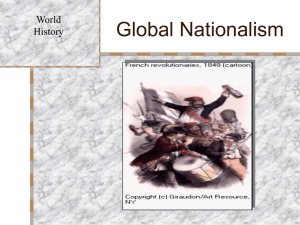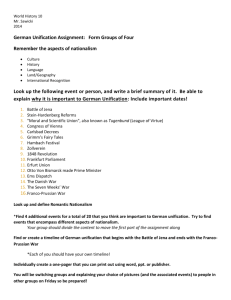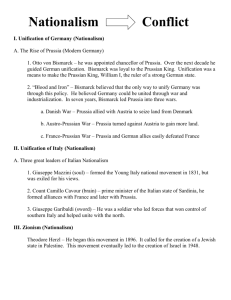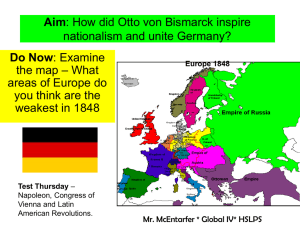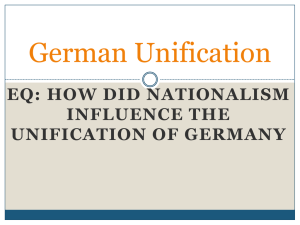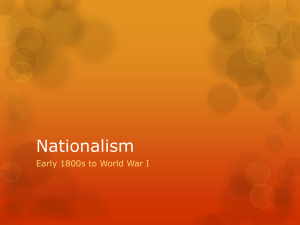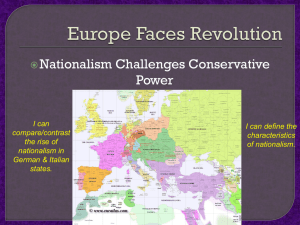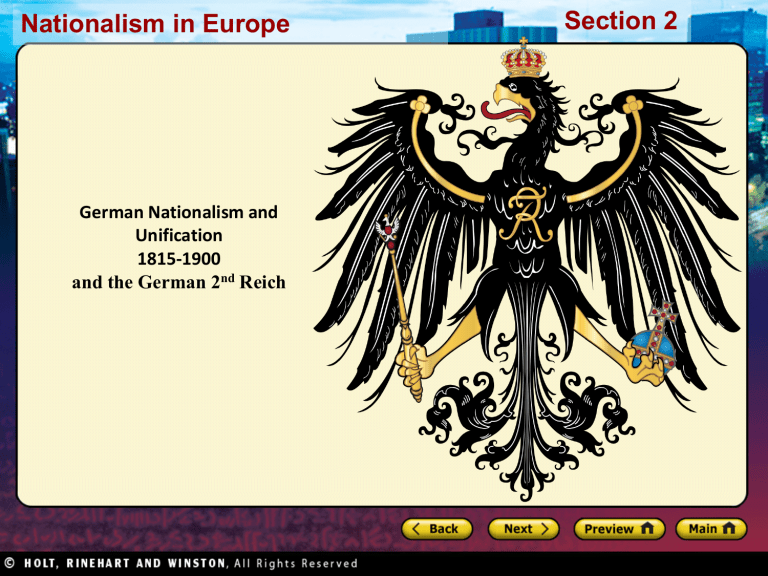
Nationalism in Europe German Nationalism and Unification 1815-1900 and the German 2nd Reich Section 2 Nationalism in Europe Nationalism Defined Section 2 Nationalism in Europe Section 2 Components of Nationalism Section 2 Nationalism in Europe What builds Nationalism? History Culture Territory Nationalism Religion Language Nationalism in Europe Historical Background • Mid. Ages Germ. part of Roman Empire • Emperor (Kaiser) was Archduke of Austria - little authority outside of Austria • Empire divided into 100s of independent states - in reality very small • During the Reformation late 1500s (i.e. 16th century) division of the N & S states of Germ into Protestant in N and Catholic in S. Section 2 Nationalism in Europe Section 2 towards a united Germany • In time states began to join together - larger ones absorbed smaller ones. In South, Bavaria became main power. In North Prussia became the main power with it being larger than Bavaria. 1862 Otto von Bismarck became P.M. of Prussia & decided to unify Germ. → did this by carrying out a war against France. "Way to unite people is to fight a successful war" Nationalism in Europe Section 2 German Unification Main Idea In the late 1800s, Otto von Bismarck transformed Germany from a loose confederation of separate states into a powerful empire. Reading Focus • What steps did Germany take toward unification? • What was Bismarck’s plan for Germany and how did he hope to achieve it? • How did wars lead to the unification of a German Empire? • In what ways did Germany grow and change after unification? Nationalism in Europe Section 2 Nationalism in Europe Economic, Cultural Unity Zollverein, 1834 • 1834, Zollverein, led by Prussia, customs union, created; removed tariffs on products traded between German states • Inspired businesspeople to support unification; encouraged growth of railroads connecting German states; joined Germans economically • German economy growing; sense of German culture growing as well Section 2 Nationalism in Europe German Nationalism Section 2 1862 Kaiser Wilhelm I of Prussia appoints Otto von Bismark as Prime Minister of Prussia Realpolitik – believed the nation’s needs should be the goal of all politics •Wanted a united Germany led by Prussia Nationalism in Europe Section 2 Otto von Bismark The less people know about how sausages and laws are made, the better they’ll sleep at night. Never believe in anything until it has been officially denied. The great questions of the day will not be settled by speeches and majority decisions—that was the mistake of previous leaders—but by blood and iron Nationalism in Europe Step #1: The Danish War [1864] Main Idea: Take control of the Northern States by Prussia. Section 2 Section 2 Nationalism in Europe Bismarck’s First War Disagreement Leads to War • Disagreement over two border states—Schleswig, Holstein— gave Bismarck opportunity to begin war with Denmark • 1864, formed military alliance with Austria against Denmark • Believed both Schleswig, Holstein should be controlled by German Confederation Result of War • After brief fight, Denmark gave territory to Austria, Prussia • Prussia controlled Schleswig, Austria controlled Holstein • Austria now held small bit of territory inside Prussia • Bismarck knew to unite Germany, war with Austria inevitable Section 2 Nationalism in Europe Unification and Empire Bismarck could not increase Prussia’s power as long as Austria was in the way. But with two short wars, Bismarck moved Austria out of the way and established a unified German Empire. Provocation • Bismarck sent Prussian troops into Austrian state of Holstein • Austria declared war on Prussia Nationalism • In address to Prussian people, King Wilhelm I blamed Austria for starting war • Appealed to peoples’ sense of nationalism Section 2 Nationalism in Europe Step #2: Austro-Prussian War [Seven Weeks’ War], 1866 Prussia Austria • Germany defeats Austria: forms the North German Confederation. • The southern states near Germany still refused to join after just one victory. Nationalism in Europe Section 2 Step #3: Franco-Prussian War • Prussia invades France to get support of Southern German States • Southern States join Prussia to defeat France German soldiers “abusing” the French. Nationalism in Europe Section 2 The Franco-Prussian War [1870-1871] Nationalism in South • 1870, conflict brewing with France over disputed Alsace, Lorraine territory • Provinces had been part of Holy Roman Empire, which included Prussia • Issue sparked nationalistic feelings in south German states Peace Treaty • Prussian Army is far better equipped and trained • Napoleon III is forced to surrender in a few weeks • Peace treaty declared unification of Germany Nationalism in Europe Franco-Prussian War Section 2 Germany Wins! • Germany gained control of two important territories: Alsace and Loraine (land rich in iron and coal needed materials for industrialization) • France had to pay Germany large amounts of money (Germany kept soldiers in France until money was paid) Nationalism in Europe Germany Unified Section 2 1871 German Unification Also Known as: The 2nd German Reich Nationalism in Europe Section 2 Nationalism in Europe Section 2 Creating the German Empire Peace treaty had far-reaching consequences • Victory established unified German empire • Representatives of allied German states met at Versailles, near Paris – Proclaimed Wilhelm I first kaiser—emperor—of German Empire – Wilhelm appointed Bismarck first chancellor • German victory changed balance of power in Europe – Napoleon III gone; France no longer as powerful – As Germany grew economically, new empire rose in power Section 2 Nationalism in Europe Sequence How did the Austro-Prussian and the Franco-Prussian wars lead to German unification? Answer(s): The Austro-Prussian War joined together the north German states. After Prussia won the Franco-Prussian War, the peace treaty declared the unification of Germany. Nationalism in Europe Section 2 The Empire’s Growth and Change In the years after 1871, Germany prospered. Under the leadership of Wilhelm I and Bismarck, Germany developed into a strong empire. This period was known as the Second Reich, or empire, because Germans considered the Holy Roman Empire to be the First Reich. A New Government Government and the Church • Germany’s 25 separate states wanted to retain some power • Bismarck believed Roman Catholic Church posed threat to government • Government took federalist form; power shared between state, national governments, Wilhelm led government • Believed government, not church, should control aspects of culture, like education • Political parties developed • Worked to restrict influence of Catholic Church in Germany This struggle between the government and the church was known as Kulturkampf, which means “the struggle for culture.” Nationalism in Europe Section 2 Economic Growth Railroads • After unification, Germany experienced time of economic growth • France had paid reparations—money for war damages • German leaders used some money to build railroads to link German states Industrial Growth • Other funds helped build German businesses • New empire began to catch up with other industrialized countries of Europe • Coal mines, steel factories flourished in Germany’s major cities Path to Social Reforms • Industrialization had critics in Germany • German socialists protested against harsh factory conditions • Called for state control of all industries Section 2 Nationalism in Europe Bismarck and Wilhelm II After Unification • Bismarck did not want to expand Germany’s borders • Believed France remained a threat, however Bismarck Out • 1888, Wilhelm’s grandson became kaiser • Wilhelm II fired Bismarck as prime minister after disagreement Alliances • Bismarck made secret alliances with Austria-Hungary, Italy, Russia • Nations agreed to help protect one another from possible attack Wilhelm II • Early 1900s, continued to make alliances with other European nations • Built up most powerful military force in Europe Nationalism in Europe Section 2 Nationalism in Europe Section 2 Why is Nationalism Important? Nationalism in Europe Section 2 Describe How did Germany change both economically and politically in the years following unification? Answer(s): vote was given to all men over 25, political parties developed, economic growth as Germany caught up with other European industrial economies, new alliances with other nations, Kulturkampf limited influence of Catholic Church
